[Dec 2007, Volume 4 Quarterly Issue] Pdf File size - The IIPM Think ...
[Dec 2007, Volume 4 Quarterly Issue] Pdf File size - The IIPM Think ...
[Dec 2007, Volume 4 Quarterly Issue] Pdf File size - The IIPM Think ...
Create successful ePaper yourself
Turn your PDF publications into a flip-book with our unique Google optimized e-Paper software.
MORE MARKETS, LESS GOVERNMENT<br />
managed by the executive. At the point<br />
of delivery it is handled by government<br />
offices and workers. Leaving aside defence,<br />
judicial service and policing, we<br />
are left with a bewildering variety of<br />
services that touch our everyday life.<br />
Need for them has appeared gradually<br />
with the evolution of governance and it<br />
was expedient for the government of the<br />
day to start producing them. But taking<br />
stock today, there is no strategic, technical<br />
or logistical reason why they can not<br />
be produced outside the government. On<br />
the other hand there is an important<br />
connection between these services and<br />
the political system. As I reason below<br />
their marketisation can improve our political<br />
system significantly. Further, for<br />
one class of services marketisation can<br />
directly alleviate deprivation, i.e. in spite<br />
of the political system.<br />
We expect three types of gain from<br />
these changes. More important are social<br />
and political. <strong>The</strong>re are of course<br />
economic benefits, though they come<br />
with adverse side effects which need to<br />
be addressed. In the social area, delegation<br />
can produce a significant dent on<br />
corruption. As long as government is the<br />
sole producer and provider, the delivery<br />
person can seek private money for service<br />
or speed. Replacing government by<br />
markets in governance can disable a<br />
large field of rent-seeking. Leaving that<br />
paid to police, bribes the public pays are<br />
to local, state and central government<br />
workers for governance services of this<br />
kind. <strong>The</strong>y can be mostly eliminated by<br />
moving them to the market and keeping<br />
the markets competitive. Improvement<br />
in the political system can come as a direct<br />
result of mitigation of corruption.<br />
Note that service at a government office<br />
can be as easily sped up by bribe as<br />
by show of political power. Those with<br />
right political affiliation easily jump<br />
service queues. Also, politicians reward<br />
people by getting their work done or<br />
sped up in return for vote or allegiance.<br />
This kind of favour is extremely valuable<br />
because certain services are indispensable<br />
for business, property, jobs, pension,<br />
healthcare, litigation, reputation or even<br />
freedom. Government workers who<br />
oblige politicians in this game expect reciprocation.<br />
Generally the return is<br />
through rewards related to their career—promotions,<br />
suitable placements<br />
and protection. This creates a second<br />
round effect on work culture as promotion<br />
gets detached from merit. It reinforces<br />
poor governance and allegiance<br />
to the political system.<br />
Through repeated feedback the nexus<br />
intensifies the corruption of politics. <strong>The</strong><br />
nexus itself becomes a stable feature<br />
rather than occasional. Given this stable<br />
relation, politics and political affiliation<br />
have emerged as the surest way of ‘getting<br />
things done’. Politics is now widely<br />
perceived as a tool for benefiting oneself<br />
rather than the community, country or<br />
nation. This image of politics leads to<br />
adverse selection in politics. Relatively<br />
competent people--- sure about their<br />
ability--- tend to stay away to avoid the<br />
stigma. At the same time those who have<br />
the taste and the ability to manipulate,<br />
subvert and criminalise tend to join politics.<br />
Obviously, we do not choose from<br />
among the best of Indians when we vote<br />
in elections. This leads to governments<br />
formed of the less competent and the<br />
corrupt. Reform that snaps the tie between<br />
politics and provision can have<br />
noticeable effect on the nature of our<br />
politics. We can also expect some direct<br />
effects on deprivation in spite of the<br />
apathy of the political system. Services<br />
like forestation, land recovery, bunding,<br />
dredging and de-silting of rivers, arid<br />
area programs etc. have direct impact on<br />
income and quality of life below and<br />
around the poverty line. <strong>The</strong>se services<br />
are under-produced in the present system<br />
and their production can be significantly<br />
increased by marketisation.<br />
On the economic side, we expect improvement<br />
in efficiency. Inefficiency of<br />
the present system shows as poor quality,<br />
Improvement of effi ciency would reduce cost and<br />
generate either taxpayers’ saving or release budgetary<br />
resource for worthwhile projects. <strong>The</strong>se overall gains<br />
will be attended with dislocation for some<br />
failure to deliver in time or to deliver at<br />
all. Cost far exceeds what is technically<br />
required. Part of the resources are<br />
drained through bureaucratic and political<br />
delay, inappropriate technology<br />
and overstaffing. Improvement of efficiency<br />
would reduce cost and generate<br />
either taxpayers’ saving or release budgetary<br />
resource for worthwhile projects.<br />
<strong>The</strong>se overall gains will be attended with<br />
dislocation for some. <strong>The</strong> most pronounced<br />
short run effect is that the government<br />
has to persuade some employees<br />
to retire. Some retirees would find<br />
employment in new outfits and others’<br />
retirement has to be financed from cost<br />
saving. If we go for this variant of reform,<br />
THE INDIA ECONOMY REVIEW<br />
37


![[Dec 2007, Volume 4 Quarterly Issue] Pdf File size - The IIPM Think ...](https://img.yumpu.com/29766298/36/500x640/dec-2007-volume-4-quarterly-issue-pdf-file-size-the-iipm-think-.jpg)
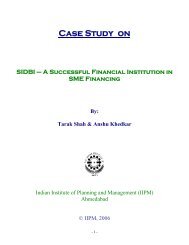
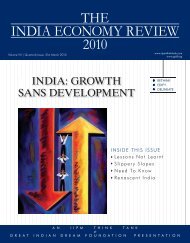
![[Feb 2008, Volume V Annual Issue] Pdf File size - The IIPM Think Tank](https://img.yumpu.com/43961117/1/190x245/feb-2008-volume-v-annual-issue-pdf-file-size-the-iipm-think-tank.jpg?quality=85)
![[June 2008, Volume V Quarterly Issue] Pdf File size - The IIPM Think ...](https://img.yumpu.com/41693247/1/190x245/june-2008-volume-v-quarterly-issue-pdf-file-size-the-iipm-think-.jpg?quality=85)

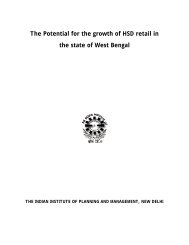
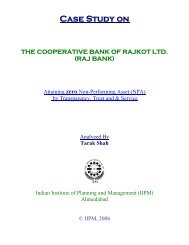
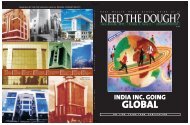
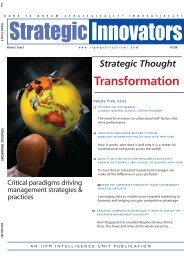
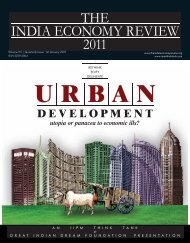

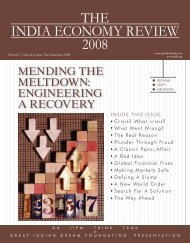
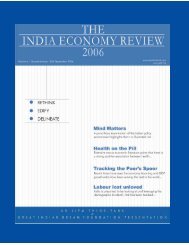
![[Volume VI | Quarterly Issue: 31st May 2009] Pdf File size](https://img.yumpu.com/27796051/1/190x245/volume-vi-quarterly-issue-31st-may-2009-pdf-file-size.jpg?quality=85)